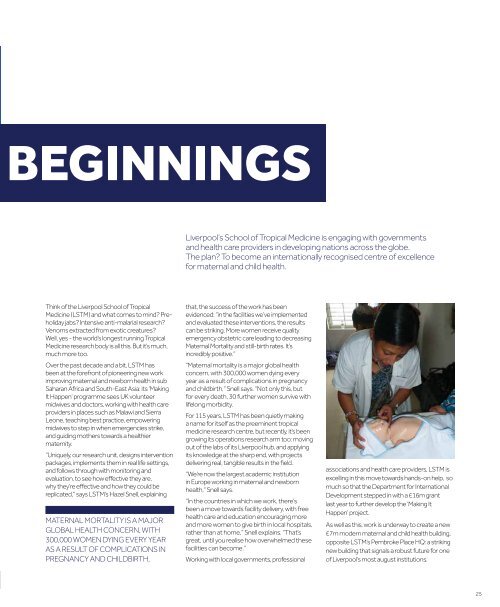here. - It's Liverpool
here. - It's Liverpool
here. - It's Liverpool
Create successful ePaper yourself
Turn your PDF publications into a flip-book with our unique Google optimized e-Paper software.
BEGINNINGS<strong>Liverpool</strong>’s School of Tropical Medicine is engaging with governmentsand health care providers in developing nations across the globe.The plan? To become an internationally recognised centre of excellencefor maternal and child health.Think of the <strong>Liverpool</strong> School of TropicalMedicine (LSTM) and what comes to mind? Preholidayjabs? Intensive anti-malarial research?Venoms extracted from exotic creatures?Well, yes - the world’s longest running TropicalMedicine research body is all this. But it’s much,much more too.Over the past decade and a bit, LSTM hasbeen at the forefront of pioneering new workimproving maternal and newborn health in subSaharan Africa and South-East Asia: its ‘MakingIt Happen’ programme sees UK volunteermidwives and doctors, working with health careproviders in places such as Malawi and SierraLeone, teaching best practice, empoweringmidwives to step in when emergencies strike,and guiding mothers towards a healthiermaternity.“Uniquely, our research unit, designs interventionpackages, implements them in real life settings,and follows through with monitoring andevaluation, to see how effective they are,why they’re effective and how they could bereplicated,” says LSTM’s Hazel Snell, explainingMaternal mortality is a majorglobal health concern, with300,000 women dying every yearas a result of complications inpregnancy and childbirth,that, the success of the work has beenevidenced: “in the facilities we’ve implementedand evaluated these interventions, the resultscan be striking. More women receive qualityemergency obstetric care leading to decreasingMaternal Mortality and still-birth rates. It’sincredibly positive.”“Maternal mortality is a major global healthconcern, with 300,000 women dying everyyear as a result of complications in pregnancyand childbirth,” Snell says. “Not only this, butfor every death, 30 further women survive withlifelong morbidity.For 115 years, LSTM has been quietly makinga name for itself as the preeminent tropicalmedicine research centre, but recently, it’s beengrowing its operations research arm too: movingout of the labs of its <strong>Liverpool</strong> hub, and applyingits knowledge at the sharp end, with projectsdelivering real, tangible results in the field.“We’re now the largest academic institutionin Europe working in maternal and newbornhealth,” Snell says.“In the countries in which we work, t<strong>here</strong>’sbeen a move towards facility delivery, with freehealth care and education encouraging moreand more women to give birth in local hospitals,rather than at home,” Snell explains. “That’sgreat, until you realise how overwhelmed thesefacilities can become.”Working with local governments, professionalassociations and health care providers, LSTM isexcelling in this move towards hands-on help, somuch so that the Department for InternationalDevelopment stepped in with a £16m grantlast year to further develop the ‘Making ItHappen’ project.As well as this, work is underway to create a new£7m modern maternal and child health building,opposite LSTM’s Pembroke Place HQ: a strikingnew building that signals a robust future for oneof <strong>Liverpool</strong>’s most august institutions.25


